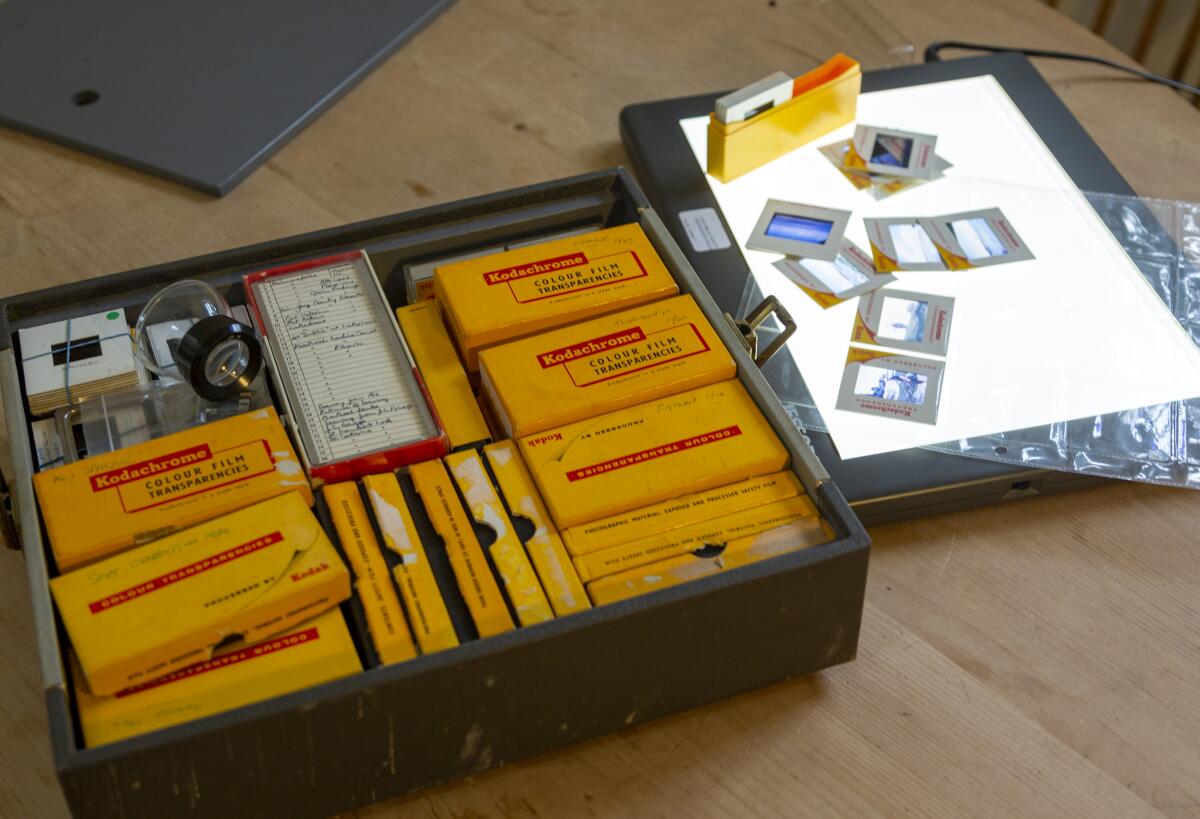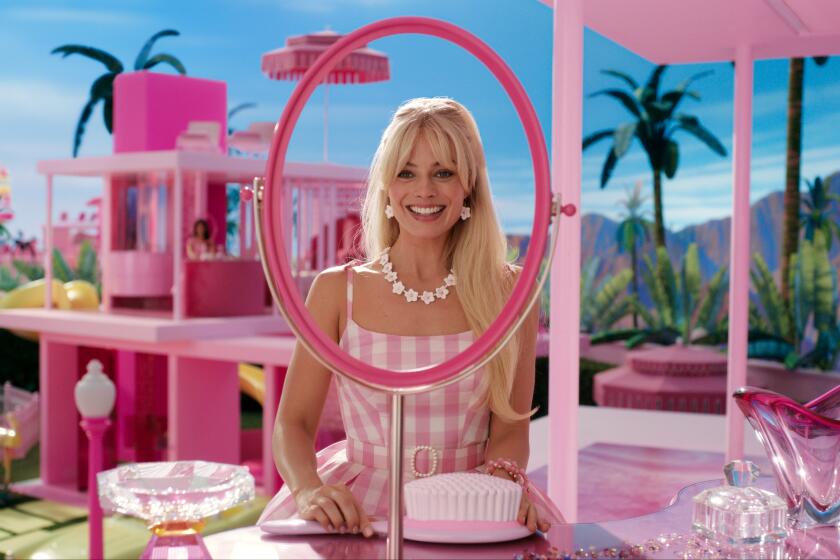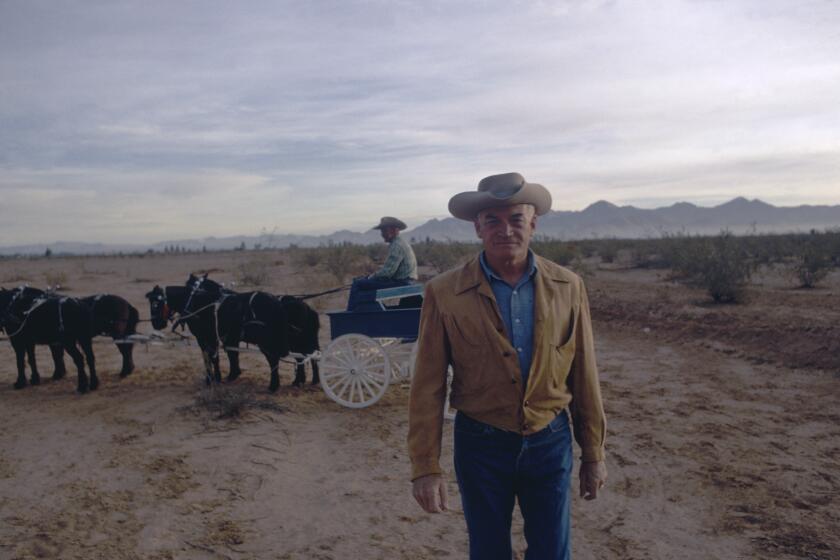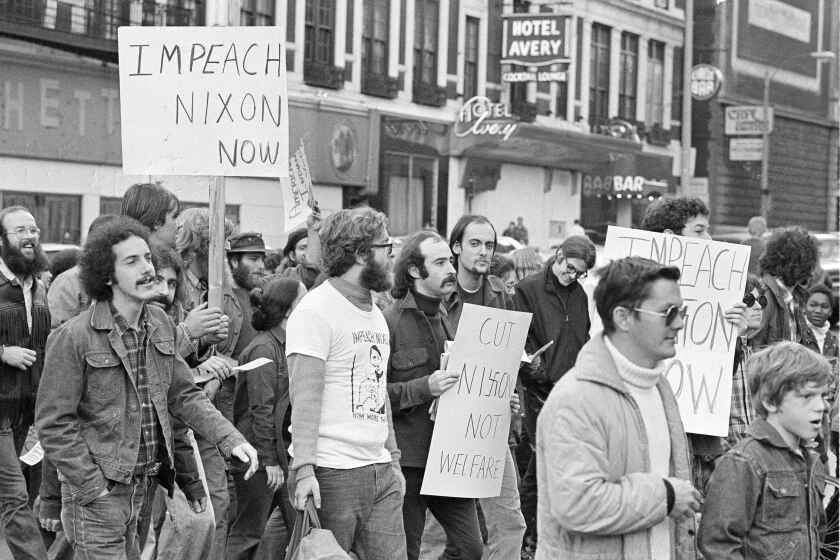Think life just keeps getting worse? Try being nostalgic — for the present

- Share via
Nostalgia seems harmless enough, and then someone starts earnestly — absurdly — glamorizing the Stone Age.
“Damn can you imagine being a human during the paleolithic age,” tweeted a self-described “eco-socialist” podcaster in September 2021. “Just eating salmon and berries and storytelling around campfires and stargazing … no jobs no traffic no ads no poverty no capitalism-caused traumas just pure vibes.”
By the time that bit of fantasy circulated on social media, romanticizing the far-off past had become a mid-pandemic, post-insurrection cultural pattern. Women were spinning yarn on Instagram, early 19th century style. Far-right zealots were parroting populist slogans, promising to restore the nation to its “former” glory, whenever that was. Across the spectrum of politics and circumstances, as we struggled to handle our unrest with modern life, we dreamed about times we never knew.
When does nostalgia go too far? And how do we find our way back?
‘Kidulting’ or ‘rejuveniling’ lets grown-ups with jobs and mortgages stay in touch with the comforts and pleasures of childhood.
I took a closer look at those questions while researching my new book on cognitive biases in the Information Age. One chapter focuses on “declinism,” the widespread misconception that life is getting irreversibly worse in every way. One might think of declinism as nostalgia’s cognitive analogue.
In general, nostalgia is deemed a healthy coping mechanism in psychology research, at least the classic form known as “personal nostalgia.” When the present feels painful — lonely, lacking in direction or meaning, even just too cold — we naturally sink into a soothing brain bath of positive memories to feel better. It works. A 2023 study found that most Americans find hope for the future by selectively reflecting on the best times from their past. Nostalgic memories are reported to be “existentially significant,” especially ones involving family, close friends and romantic partners.
But as the 2024 election approaches, I can’t help worrying that public figures and politicians will take advantage of nostalgia’s appeal for their own gain. When politicians strategically manipulate nostalgia, they rely not on memories of people’s real experiences but rather on oversimplifying or catastrophizing today’s problems by perpetuating delusions of an idyllic past. “These … propagandistic strategies help to convince people that their current situation is worse than it actually is,” wrote Felipe De Brigard, a professor of philosophy, psychology and neuroscience.
Cowboying has virtually disappeared in the state, but Western attire has a new purpose: to broadcast right-leaning ideology.
Weighing the political risks against the coping benefits of nostalgia, I wondered: Shouldn’t we encourage more accurate representations of history and also orient our idealizations of the past toward the present?
Nostalgia for the present is a phenomenon defined by missing something that is not yet lost. Anticipatory nostalgia, as it is sometimes described, can be both a feeling and a thought exercise. According to psychology professor Krystine Batcho, “Nostalgia for the present as imagined from a future perspective can direct us to appreciate and seek the best of what is possible. Feeling the sad longing for our present before it’s gone can encourage us to make good choices now.” In a 2020 study of anticipatory nostalgia in marketing (such as the Kodak tagline “Life’s little moments don’t stay forever”), Batcho found that the inclination to hold onto the present might paradoxically “jeopardize full engagement with it.” But it also can make unpleasant moments feel less challenging because we know they are temporary. Anticipatory nostalgia encourages us to acknowledge and accept the inevitability of change. For those feeling unsatisfied with their current lives, anticipatory nostalgia decreased anxiety while enhancing meaningfulness and “a greater appreciation of the moment (for what it is).”
A Pew survey from 2023 found that the majority of Americans believe life was better 50 years ago. “If you ask that question abstractly, people respond that way,” research psychologist Clay Routledge told me. But if you start asking more specific questions such as, “Would you give up today’s medical advancements to go back 50 years? If you’re raising a daughter, would you trade all the progress in women’s rights and opportunities?” most respondents walk back their answers. It turns out, they realize, life is objectively better in the present.
Nostalgia, a constant in U.S. history, has people longing for the era of ‘stagflation,’ the Vietnam War and Watergate.
Routledge also cited a 2023 Harris Poll that found that Americans across generations are nostalgic for a time before smartphones. We don’t earnestly wish to go back in time, he explained, but rather to make the best of what the past and present each have to offer: “Even young generations are recognizing that there’s something in these phones that’s making us stressed or distracting us from the kind of deep personal relationships that we find meaningful. We don’t want to give up these phones. But we want to use them more intentionally.”
I asked Routledge how we can harness what’s good about nostalgia and apply it to the current moment — how to romanticize the present, so we don’t get lost in the paleolithic past or apocalyptic future. I told him that sometimes when I worry about getting older and wistfully scroll through old photos, I can interrupt the spiral by imagining I’m actually 75 years old and someone tells me that at the snap of my fingers, I get to be 32 again. Suddenly I’m grateful for the life I have at the moment.
Routledge suggested that to maximize nostalgia for the present, we should prioritize the types of experiences for which we tend to develop personally nostalgic memories. His research shows that these moments tend to be highly social, focused on relationships and involve taking some level of emotional risk. For example, a get-together that makes you nervous, or visiting a relative whose health is in decline. These are not always happy or pleasurable experiences. Sometimes they’re bittersweet, or even painful — the way that nostalgia can be.
Feeling nostalgic for old memories is normal, and often even helpful. It’s when influential figures weaponize delusions of the past that we can get stuck. It’s important to remind ourselves that the memories we may become most nostalgic for could be yet to come. And, if the present is as good as it gets — good news, it’s still here.
Amanda Montell is a linguist and podcast host in Los Angeles. Her newest book is “The Age of Magical Overthinking: Notes on Modern Irrationality.” @amanda-montell
More to Read
A cure for the common opinion
Get thought-provoking perspectives with our weekly newsletter.
You may occasionally receive promotional content from the Los Angeles Times.












